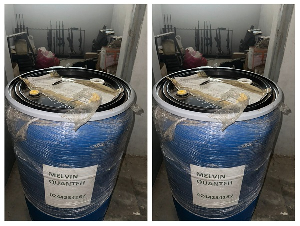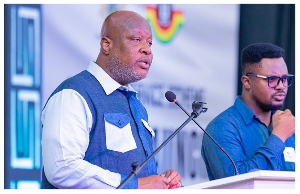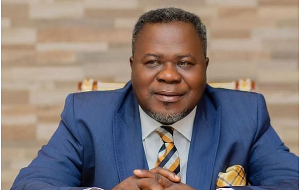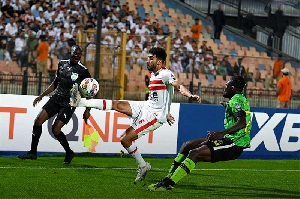Accra (Greater Accra), 22 Feb. ?99
The Governor of the Bank of Ghana (BOG) on Monday reminded ECOWAS member-countries to stick to the criteria listed for macro-economic convergence in order to prepare them fully towards a single currency unit.
These are the reduction in exchange rate variability to 10 per cent a year, reduction in the rate of inflation to a single digit and reduction in budget deficit and Gross Domestic Product (GDP) ratios to five per cent by 1998 and three per cent by 2000.
Dr Kwabena Duffuor who was launching the ECOWAS Travellers Cheques in Accra, noted that a ceiling had been placed on Central Banks' financing of government to 10 per cent of revenue generated in the previous year. The cheques are in five, 10, 20, 50 and 100 West African Unit of Account (WAUA) and are legal tender in the sub-region. The design of the cheque is indigenous to the sub-region and includes the ECOWAS logo as well as names and flags of member countries.
It has security features such as security thread, water mark and rich intaglio workings. WAUA is equivalent to 1.36 Special Drawing Rights (SDRs), the IMF's unit of account. It is convertible into any of the currencies in the sub- region.
Dr Duffuor said even though these might not be welcomed by some governments, "these are the rules designed to guide domestic policy makers in each member-country towards the cherished goal of a single currency in the sub-region".
He said the launching of the cheques marks a significant milestone in the annals of ECOWAS and the beginning of the realisation of the cherished dream of a single monetary zone. Dr Duffuor said he was impressed about Ghana's report in reaching the convergence point in the past year where significant progress was made in meeting the criteria. "Inflation has declined steadily, the exchange rate has been relatively stable and fiscal performance has shown significant improvement, especially in the domestic primary balance."
The Governor said the Central Bank intends to consolidate these gains this year by pursuing prudent policies that will put Ghana on a smooth path towards monetary co-operation in the sub-region. He expressed the hope that member-countries are putting measures in place that will ensure that they meet the necessary convergence requirements.
Dr Duffuor expressed regret that in spite of all these achievements, economic integration still poses a challenge to ECOWAS. He said implementation of policies and protocols towards elimination of trade barriers and other obstacles are still fraught with reluctance and problems. Dr Duffuor traced the history of the cheques to the 1970s when ECOWAS brought to the fore the need for harmonisation of monetary and economic policies in the region. He said the founding fathers identified monetary co-operation long before the Maastritch Treaty which formally established the European Monetary Union signed in Brussels and resulted in the Euro which was launched last January. However, it was not until 1983 that the ECOWAS Heads of State mandated the Committee of Governors to set up institutions that would promote the idea. Subsequently the ECOWAS Co-operation Programme was adopted in 1987 under the auspices of the erstwhile West African Clearing House, now known as West African Monetary Association (WAMA), and the West African Bankers Association (WABA).
Mr David Asante, an official at the ECOWAS Secretariat in Abuja, Nigeria, urged commercial banks to purchase the cheques for public patronage, saying that they will have one per cent commission on cheques sold. He said the sub-region faces serious challenges with the advent of globalisation and regionalism, adding that if strong nations are merging their economies and conglomerates West Africa must respond strongly. "The introduction of the Euro has far-reaching implications of globalisation and we see this event as a significant one as part of efforts towards meeting the challenge of the next century. "Indeed it is relevant in enabling us to enter the larger economic market place". Mr Asante explained that about eight different documentation procedures would be involved in avoiding forgery. Mr Asante said the cheques can be used at hotels, bureaux de changes, commercial banks and noted that it will reduce a lot of the cash- based transactions.
Mr Moses Asaga, Deputy Minister of Finance, congratulated the originators of the cheque and praised Ghana for advancing towards micro indicators needed for the implementation of a single currency. A representative of the Association of Bankers welcomed the introduction of the Travellers Cheques in Ghana and expressed the hope that they will ease trade within the region. He said the one per cent commission is, however, too small and unattractive and hoped it will be increased with time.












